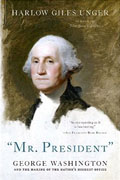Mr. President
Harlow Giles Unger
book reviews:
· general fiction
· chick lit/romance
· sci-fi/fantasy
· graphic novels
· nonfiction
· audio books
· author interviews
· children's books @
curledupkids.com
· DVD reviews @
curledupdvd.com
newsletter
win books
buy online
links
home
for authors
& publishers
for reviewers

 |
Mr. President: George Washington and the Making of the Nation's Highest Office Harlow Giles Unger Da Capo Press Paperback 288 pages February 2015 |
|
The early days of the United States of America—in particular, the circumstances leading to the creation of the American constitution and the first presidency—have aroused the interest of numerous scholars. As a result, it is fair to say that a lot has now been written on these topics. In this book, author Harlow Giles Unger contributes to this body of work by providing a lucid perspective on the many ways in which George Washington transformed the American presidency from a largely ceremonial post to the most powerful office in the land.
This early realization led Washington to take a number of actions to consolidate his hold on the office of the presidency and to set a precedent for subsequent occupiers of this office. In his first year in office, Washington “raised two of seven pillars of presidential power...control over foreign affairs and control over executive appointments and the executive branch of government” (p. 93). These actions resulted in the streamlining of government operations. More importantly, they allowed Washington to respond to security threats with speedy, unilateral actions. The decision by Congress to assume the debts of the individual states caused great consternation among some such as Patrick Henry, who considered this assumption to be fundamentally unconstitutional. The Treasury Secretary, Alexander Hamilton, warned Washington that Henry’s line of thinking needed to be dealt with firmly and quickly. To this end, Hamilton asked Congress to permit the Treasury to establish a sinking fund for collecting revenues to retire the national debt and to enact a tax on domestic and imported liquors and domestic stills. Congress agreed and hence assumption “proved to be an enormous political and economic triumph for Washington and Hamilton, who together now raised another pillar of power in the presidential edifice: the power over the public purse” (p. 125). In the aftermath of the French Revolution, France declared war on Britain and some other nations in February 1793. This raised the question as to whether—as a result of an earlier Franco-American treaty of alliance—the United States (US) was treaty-bound to aid France in its offensive war against Britain. Alexander Hamilton argued that the US was not, but Secretary of State Thomas Jefferson contended that the US was. Washington sided with Hamilton. The author does a good job of discussing the circumstances that followed, particularly the many attempts by the French ambassador Edmond-Charles-Edouard Genet to destabilize the US and convert it into a French puppet state. Genet almost succeeded in his diabolical attempts and, as a result, “Washington’s presidential edifice was tottering. With no law enforcement arm at his disposal, his other pillars of power seemed ready to fall, along with the American republic.” (p. 169)Washington confronted many other crises during his two terms in office. The author contends that Washington did the best he could to deal with these efficaciously and that, more generally, he was an astute and selfless President. Even so, we are told that Washington’s biggest failing was that he was “unable to unite Americans and convince them all to embrace the nation as [their nation].” (p. 222) The author occasionally lets his zeal get the better of him, and one can quibble with his descriptions of specific historical events. Even so, this is a well-written tome that provides a thought-provoking perspective on the ways in which Washington’s dramatic expansion of presidential powers—without constitutional sanctions—turned out to be beneficial for the nascent American nation. Originally published on Curled Up With A Good Book at www.curledup.com. © Amitrajeet A. Batabyal, 2014 |
| Also by Harlow Giles Unger: |
|
|
|
 Click here to learn more about this month's sponsor! |
|
| fiction · sf/f · comic books · nonfiction · audio newsletter · free book contest · buy books online review index · links · · authors & publishers reviewers |
|
| site by ELBO Computing Resources, Inc. | |
 The author rightly begins by pointing out that the Constitution, as written, gave the President almost no power. In fact, it left several salient terms such as “executive power” undefined. Although this may have been a result of the tyranny the framers of the Constitution and others suffered under Britain’s monarch George III, in effect, this unsettled state of affairs meant that the first American president—George Washington—had little formal authority. Washington knew that in order to gain and retain the trust of the people, he would have to build an “effective governmental structure” (p. 63) before the people turned on him. However, the key issue was that in order to do so, “he would need more powers than the Constitution had granted him...” (p. 63).
The author rightly begins by pointing out that the Constitution, as written, gave the President almost no power. In fact, it left several salient terms such as “executive power” undefined. Although this may have been a result of the tyranny the framers of the Constitution and others suffered under Britain’s monarch George III, in effect, this unsettled state of affairs meant that the first American president—George Washington—had little formal authority. Washington knew that in order to gain and retain the trust of the people, he would have to build an “effective governmental structure” (p. 63) before the people turned on him. However, the key issue was that in order to do so, “he would need more powers than the Constitution had granted him...” (p. 63).